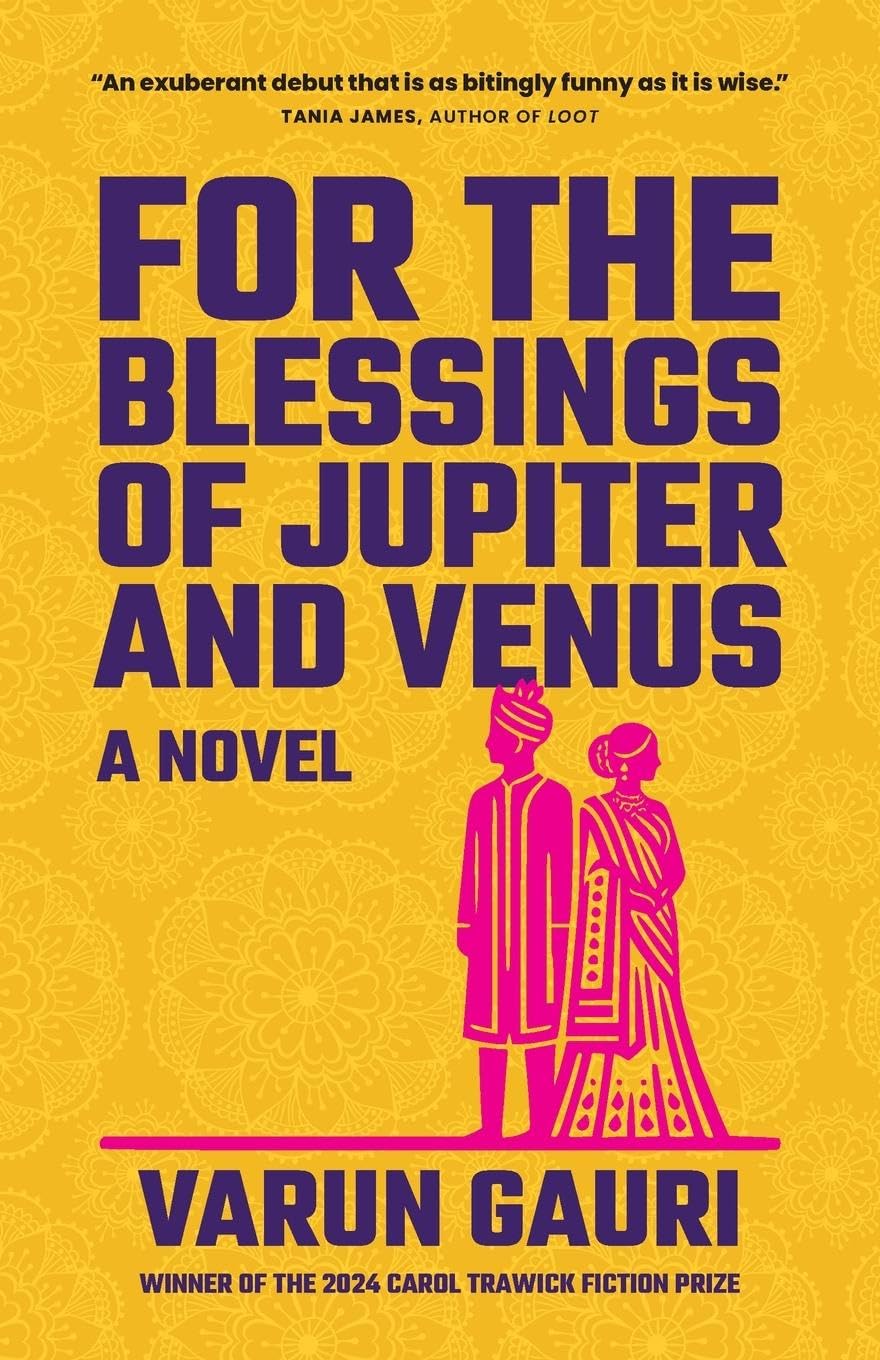For the Blessings of Jupiter and Venus: A Novel
- By Varun Gauri
- Washington Writers’ Publishing House
- 236 pp.
- Reviewed by Terri Lewis
- October 18, 2024
Arranged marriage features prominently in this witty tale of Indians in Ohio.

Laden with a heavy veil and gold bangles, Meena is getting married in front of a crowd of “two hundred thirty-four guests, plus or minus the last-minute cousin who might or might not arrived from Chandigarh.” Her mother and sister have flown in from Delhi. The groom is represented by proud parents, aunties in sarees, and the Punjabi 5, a set of “uncles” who are best friends with the groom’s father. Soon, Meena will recite her vows in memorized Sanskrit, but now the officiant, a retired accountant — their small Ohio town lacks a full-time Brahmin priest — chants and pours ghee into a bowl. The Vedic rituals are unfamiliar to Meena.
The groom is also unfamiliar. Fed up with jet-setting, assured by her last lover that he’ll never leave his wife, and encouraged by her dying father, Meena has chosen arranged marriage 2.0: She bypassed her parents and matchmakers to find Chicagoan Avi on a website for men seeking brides. She liked his solidity — conveyed via a picture of him throwing a football — and his comment to her: “Let’s give this thing a shot.” At their single Starbucks coffee date, Avi proposed to Meena with his eyes. She agreed with a slight nod, and now here they are.
It’s a festive occasion with mounds of flowers and incense and special food, despite Rav Uncle pulling Meena aside for an uncomfortable looking-over and her mother-in-law’s gift of a vacuum cleaner. Then there’s Avi’s wedding toast: a rousing campaign speech about his unopposed run for local township trustee. As the first Hindu to hold that position, he vows to make Diwali a school holiday and bring honor to his community.
Meena understandably wishes to hear other sentiments at her nuptials, but the couple soon dances, money is thrown at their feet, and suddenly it’s all over. Her mother and sister accost her with snarky congratulations, she defends her new family, and then, it’s off to their wedding night.
For the Blessings of Jupiter and Venus is structured with chapters told in alternating viewpoints, so now it’s Avi’s turn. He’s a dreamer. “Avi felt a sphinx moth brush against his hair,” writes Gauri. “The night was languid and warm, and lemony moonlight glinted off the cars.” He’s also a worrier, with good reason. He manages to completely bungle their first night as husband and wife, throwing out his back while fixing a showerhead. Embarrassed, he doesn’t admit to the pain, but he can’t make love to Meena. Instead, they spend the evening quizzing each other about their families and past lovers, as if they’re on a first date. Which, in essence, they are.
After this fun setup, the story follows the halting progress of their marriage. Meena, feeling sad and let down, acquiesces to the expectations of her mother-in-law and fields phone calls from her mother and sister about her (non-existent) sex life. The political element expands as Avi works to make his community proud. At a disastrous public forum, the otherness of his Hinduism in the Midwestern town becomes clear by the many references to “you people.”
Unfortunately, despite some telling scenes and witty lines, the narrative stalls. The Indian community comes to life, but the characters seem static. Avi worries about his absent sex life and the election, and he alternately tries to impress and takes advice from the Punjabi 5. Meena, who once wrote scientific papers with her lover and attended conferences in Davos, Bellagio, and Bariloche, also worries about sex but accepts her mother-in-law’s instructions and her husband’s distance. Meanwhile, the reader struggles to understand why either chose this arrangement.
Meena cites an admonition from her father, who said every marriage becomes an arrangement sooner or later. Avi wonders if giving up his life in Chicago to return to Ohio, care for his parents, and run for an office he doesn’t really want will make him Indian enough. Yet these intriguing ideas are never fully explored.
The story is rooted in the immigrant community — the obligations, the rituals, and the contrasts between Indians in America and, later, in Delhi. The former cling to traditional values; the latter are shown enjoying superficial nightlife but maintaining fealty to the concept of arranged marriage.
Eventually, Avi and Meena have sex, and when she gets pregnant, the plot accelerates. A white political challenger to Avi comes forward, saying, “You people are too clannish for Southgate.” A disaster awakens Meena from her lethargy, a proper arranged marriage comes to the fore, and Avi is forced to face his fears. The book’s ending, while not tying up every loose thread, is satisfying.
This is a novel about marriage, and couples haunt the story, beginning with Meena, who just wanted a decent guy, and Avi, who chose Meena because she represented the kind of girl he was proud to attract. It will appeal to readers who enjoy wry humor and rooting for characters struggling to define themselves amid strong, sometimes stifling cultural strictures. Oddly enough, it’s Meena’s former lover who sums the situation up best:
“Marriage is indeed one of the knottiest institutions ever invented. It makes central banking seem like arithmetic.”
Terri Lewis is a writer living in Denver, Colorado, with her husband and two entertaining dogs. Her debut novel, Behold the Bird in Flight, about the abduction and coming to power of Isabelle, King John’s second wife, will be published next June.

